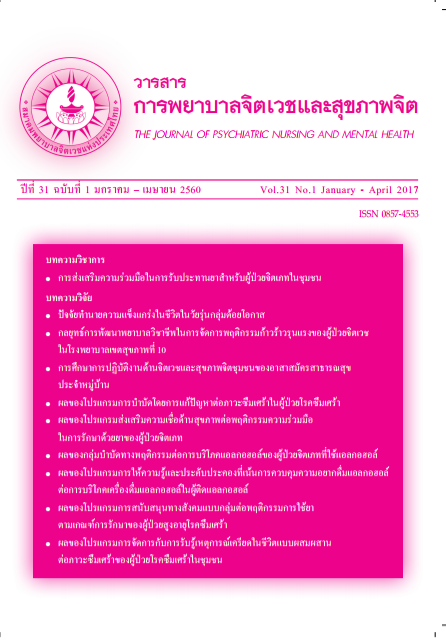ผลของโปรแกรมการจัดการกับการรับรู้เหตุการณ์เครียดในชีวิต แบบผสมผสานต่อภาวะซึมเศร้าของผู้ป่วยโรคซึมเศร้าในชุมชน* THE EFFECT OF INTEGRATED PERCEIVED STRESSFUL LIFE EVENT MANAGEMENT PROGRAM ON DEPRESSION OF DEPRESSIVE DISORDER PATIENTS IN COMMUNITY
Main Article Content
บทคัดย่อ
Abstract
Objective: The purpose of this quasiexperimental pretest-posttest with control group research design was to determine the effect of the integrated perceived stressful life event management program on depression of depressive disorder patients in the community.
Method: The subjects were 40 patients diagnosed with depressive disorder, aged of 20-59 years, at the psychiatric clinic, out-patient department of a community hospital. They were matched pairs by sex, similar age and depression scores and then randomly assigned into the experimental and control groups, 20 subjects in each group. The experimental group received the integrated perceived stressful life event management program whereas the control group received routine nursing care. Research instruments consisted of the integrated perceived stressful life event management program, life stress event questionnaire and the Thai Hamilton Rating Scale for Depression. The integrated perceived stressful life event management program was validated for content validity by 5 professional experts. Reliability of the life stress event and the Thai Hamilton Rating Scale for Depression were reported by Cronbach,s Alpha coefficient as of .91 and .82, respectively. Data were analyzed using descriptive statistics, dependent and independent t-tests.
Results:1) The depression of patients with depressive disorder in the community after receiving the integrated perceived stressful life event management program was significantly lower than that before (t = 29.442, p < .05) 2) The depression of depressive disorder patients in the community after received integrated perceived stressful life event management program was significantly lower than that of those who receiving routine nursing care (t = 12.668, p < .05).
บทคัดย่อ
วัตถุประสงค์: การวิจัยกึ่งทดลองแบบสองกลุ่มวัดก่อนและหลังการทดลองเรื่องนี้ มีวัตถุประสงค์เพื่อศึกษาผลของโปรแกรมการจัดการกับการรับรู้เหตุการณ์เครียดในชีวิตแบบผสมผสาน ต่อภาวะซึมเศร้าของผู้ป่วยโรคซึมเศร้าในชุมชน
วิธีดำเนินการ: กลุ่มตัวอย่าง คือ ผู้ป่วยโรคซึมเศร้าอายุ 20-59 ปี ซึ่งเข้ารับการรักษาแบบผู้ป่วยนอกที่คลินิกจิตเวช โรงพยาบาลชุมชน จำนวน 40 คน ได้รับการจับคู่ให้มีคุณลักษณะที่ใกล้เคียงกันในเรื่อง อายุ เพศ และคะแนนภาวะซึมเศร้า จากนั้นได้รับการสุ่มเข้าเป็นกลุ่มทดลองและกลุ่มควบคุม กลุ่มละ 20 คน กลุ่มทดลองได้รับโปรแกรมการจัดการกับการรับรู้เหตุการณ์เครียดในชีวิตแบบผสมผสาน กลุ่มควบคุมได้รับการพยาบาลตามปกติ เครื่องมือที่ใช้ในการวิจัย คือ 1) โปรแกรมการจัดการกับการรับรู้เหตุการณ์เครียดในชีวิตแบบผสมผสาน 2) แบบสอบถามเหตุการณ์เครียดในชีวิต และ 3) แบบประเมินภาวะซึมเศร้า ซึ่งโปรแกรมฯ ผ่านการตรวจสอบความตรงตามเนื้อหา โดยผู้ทรงคุณวุฒิจำนวน 5 ท่าน เครื่องมือแบบสอบถามเหตุการณ์เครียดในชีวิต และแบบประเมินภาวะซึมเศร้า มีค่าความเที่ยงสัมประสิทธิ์แอลฟาของครอนบาค เท่ากับ .91 และ .82 ตามลำดับ วิเคราะห์ข้อมูลโดยใช้สถิติเชิงพรรณนาและสถิติที
ผลการศึกษา: 1) ผู้ป่วยโรคซึมเศร้า หลังได้รับโปรแกรมการจัดการกับการรับรู้เหตุการณ์เครียดในชีวิตแบบผสมผสาน มีระดับภาวะซึมเศร้าต่ำกว่าก่อนได้รับโปรแกรมฯ อย่างมีนัยสำคัญทางสถิติที่ระดับ .05 (t = 29.442, p < .05) 2) ผู้ป่วยโรคซึมเศร้ากลุ่มที่ได้รับโปรแกรมฯ มีระดับภาวะซึมเศร้าต่ำกว่ากลุ่มที่ได้รับการพยาบาลตามปกติอย่างมีนัยสำคัญทางสถิติที่ระดับ .05 (t = 12.668, p <.05)
Article Details
บทความที่ได้รับการตีพิมพ์แล้ว เป็นลิขสิทธิ์ของสมาคมพยาบาลจิตเวชแห่งประเทศไทย


